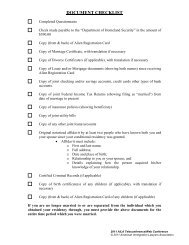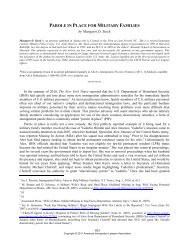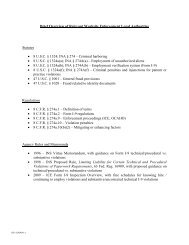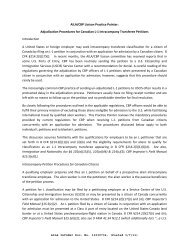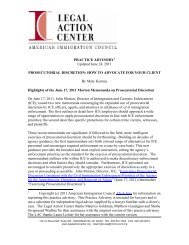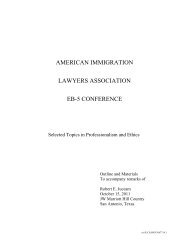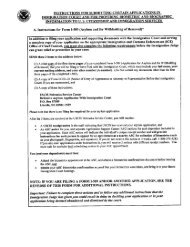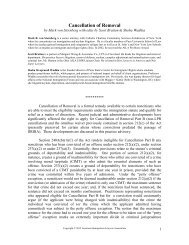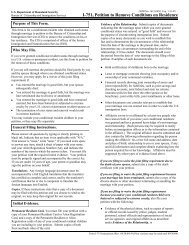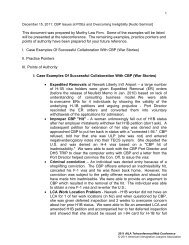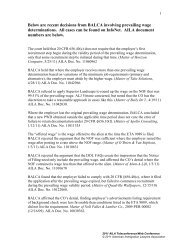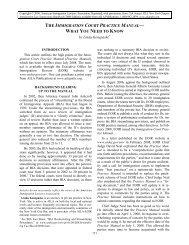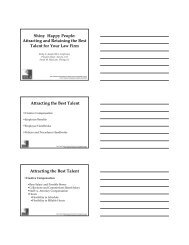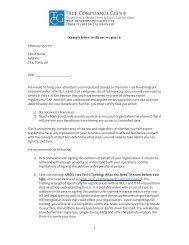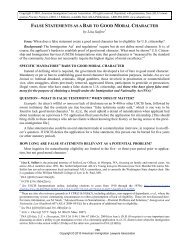Immigration Practice Pointers, 2010-11 Ed. - AILA webCLE
Immigration Practice Pointers, 2010-11 Ed. - AILA webCLE
Immigration Practice Pointers, 2010-11 Ed. - AILA webCLE
Create successful ePaper yourself
Turn your PDF publications into a flip-book with our unique Google optimized e-Paper software.
SURVIVING RELATIVES: NEW WAYS TO RESUSCITATE A DEAD PETITION OR APPLICATION <strong>11</strong>3<br />
Remarriage<br />
The clear statutory language of §201(b)(2)(A)(i) covering self-petitioning widow(er)s of U.S. citizens bars<br />
self-petitioning eligibility for widow(er)s who remarry. In response to the Draft Policy Memo, however,<br />
<strong>AILA</strong> responded that §204(l) nevertheless provides relief to those who remarry:<br />
A widow(er) whose U.S. citizen spouse filed an I-130 petition before dying, and who remarries prior to<br />
being admitted to lawful permanent resident status, still qualifies as an “alien described” in INA<br />
§204(l)(2)(A) because the alien, “immediately prior to the death of his or her qualifying relative, was—(A)<br />
the beneficiary of a pending or approved petition for classification as an immediate relative (as described<br />
in section 201(b)(2)(A)(i)).” INA §204(l)(2)(A). By fixing the point of eligibility before the death, the<br />
statute clearly contemplates eligibility for those who were spouses of U.S. citizens immediately prior to<br />
the death of the qualifying relative. The statute does not require the widow(er) to continue to be the spouse<br />
of a U.S. citizen; only that he or she “was” an immediate relative at the time of death, and was the<br />
beneficiary of a petition.” 6<br />
This argument is further strengthened by the language of §204(l)(1), which requires that the petition be<br />
adjudicated “based upon the family relationship described in paragraph (2),” because that family relationship<br />
is described in terms fixing the relationship “immediately prior to the death.” USCIS bases its contrary<br />
position only upon the remarriage bar contained in §201(b)(2)(A)(i). 7 This statute, however, does not pertain<br />
to widow(er)s of lawful permanent residents (LPRs) in the 2A category, and it cannot be reconciled with the<br />
clear language of §204(l). This is an area, therefore, where an appeal to the BIA or litigation may find fertile<br />
ground.<br />
Affidavit of Support<br />
Another area of concern is in the area of the I-864 Affidavit of Support. USCIS takes the position that the<br />
petitioner’s I-864 is no longer valid. 8 In order to be admissible, therefore, a survivor must either show<br />
exemption from the I-864 requirement or obtain an I-864 from a “substitute sponsor” who must be related to<br />
the applicant in one of the ways described in §213A(f)(5). 9 This may be impossible in cases where the<br />
survivor does not have one of the relatives listed. The substitute sponsor requirement is absolute, according to<br />
USCIS, and neither the alien’s own funds nor joint sponsors can cure the absence of a substitute sponsor.<br />
<strong>AILA</strong> previously commented that in cases where the petitioner (now deceased) executed an I-864 prior to the<br />
death, the affidavit of support requirement should be deemed to have been met because it was a related<br />
application. 10 USCIS disagreed, stating that the I-864 is neither a petition, nor an application, nor a related<br />
application. <strong>11</strong> Because there will undoubtedly be survivors who qualify for §204(l), save for lack of a<br />
qualifying substitute sponsor, it appears that litigation may be necessary to advance survivors’ rights in this<br />
area.<br />
Discretion<br />
The Policy Memo lacks the necessary clarity on the issue of discretion, which could lead to erroneous<br />
denials. Specifically, §204(l) does authorize the agency to withhold approval where the secretary of the<br />
Department of Homeland Security determines that “approval would not be in the public interest.” 12 Such<br />
discretion is unreviewable. 13 According to the Policy Memo, however, discretionary “public interest” denials<br />
6 Id., p. 3.<br />
7 Policy Memo, p. 3.<br />
8 Policy Memo, p. 9.<br />
9 Relatives include, “spouse, parent, mother-in-law, father-in-law, sibling, child (if at least 18 years of age), son, daughter, sonin-law,<br />
daughter-in-law, sister-in-law, brother-in-law, grandparent or grandchild of a sponsored alien or a legal guardian of a<br />
sponsored alien…” INA §213A(f)(5)<br />
10 <strong>AILA</strong> Comment, p. 10–<strong>11</strong>.<br />
<strong>11</strong> Policy Memo, p. 9.<br />
12 INA §204(l)(1).<br />
13 Id.<br />
Copyright © 20<strong>11</strong> American <strong>Immigration</strong> Lawyers Association



